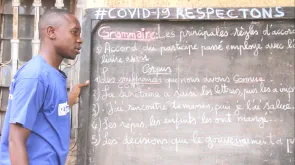En Guinée comme dans la plupart des pays autour du monde, la pandémie du COVID19 a ralenti, voire mis un frein, à l’offre de services de base et essentiels, tant économiques que sociaux… et même scolaires. Cependant, grâce à la technologie, des moyens novateurs voient le jour dans le pays et dans le reste du monde, surtout adaptée à l’enseignement, afin de s’assurer que les élèves et étudiants continuent à apprendre malgré la quarantaine dont ils font aussi l’objet. Ousmane Bangoura, Volontaire ONU national, Community Manager pour le projet YouthConnekt du Programme des Nations Unies pour le Développement (PNUD), dispense des cours à distance dans un contexte particulier marqué par le COVID19.
En raison de la pandémie du COVID19, 91 pour cent de la population estudiantine mondiale a été congédiée des écoles et autres structures de formation académique qui ont été fermées afin d’atténuer l’impact direct de la pandémie. Cette mesure a pris effet en Guinée le 24 mars 2020, suite une déclaration conjointe des Ministres chargés de l’Education nationale et de la Formatons, et affecte plus de six millions d’élèves et étudiants tout autour du pays.
Afin de permettre aux enfants dans le pays de poursuivre le programme scolaire national, Ousmane Bangoura propose des cours en ligne, partagés sur YouTube. Selon lui, même si tous les élèves n’ont pas accès à ces cours en ligne, beaucoup d’entre eux apprécient l’initiative et y participent. Dans ce pays où 42,66 pour cent de la population a accès à internet, les cours en ligne sont un moyen de continuer à enseigner, malgré la fermeture des écoles.
“L’enseignement en ligne a été une grande alternative servant à fournir un service minimum aux élèves actuellement en quarantaine en raison du COVID19. Même si cette initiative ne touche pas tous les élèves en raison de quelques positions géographiques, je reste convaincu que beaucoup d’autres apprécient l’initiative et participent aux cours de manière simultanée. » - Ousmane Bangoura
Ousmane bénéficie d’un soutien conséquent suite a son premier cours en ligne. Il voit les cours en ligne comme un pont entre les divers systèmes éducatifs africains, tout comme un moyen de combattre l’analphabétisme sur le continent.
Titulaire d’un diplôme de Journaliste Reporter d’Images, Ousmane utilise, depuis plus de 5 ans, ses compétences dans le domaine de l’audiovisuel pour créer et gérer une page Facebook de formation en ligne intitulée « La Grammaire française pour tous ». Le groupe compte une communauté de 300.000 membres, tous de pays tels que le Sénégal, le Tchad, le Mali ou encore la Cote d’Ivoire, qui suivent ses activités au travers des réseaux sociaux.
« Je suis spécialisé en outils audiovisuels, ce qui me permet d’être utile à ma communauté a travers la production de vidéos parlant des initiatives communautaires que je soutiens en leur apportant plus de visibilité » - Ousmane Bangoura
Il est aussi engagé auprès de sa communauté en produisant des vidéos promouvant les initiatives communautaires. Par exemple, le 29 mars 2020, il a diffusé la vidéo d’un groupe de jeunes volontaires offrant des kits sanitaires aux femmes dans les marches de Conakry, la capitale. En parallèle à ses activités de volontaires, Ousmane Bangoura mène un plaidoyer pour une plus grande implication des médias dans la lutte contre le stigmate lié au COVID19, en diffusant des informations officielles concernant la pandémie. Toutes ces activités relatives à l’engagement d’Ousmane démontrent de sa conviction selon laquelle l’éducation et la recherche sont des éléments clés dans la lutte contre le virus en Afrique.

